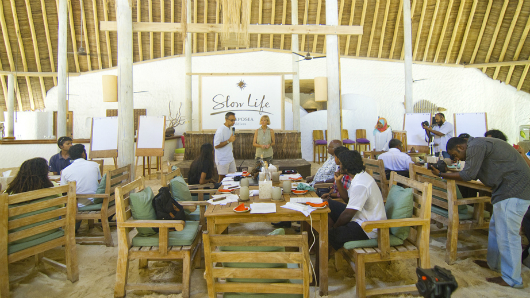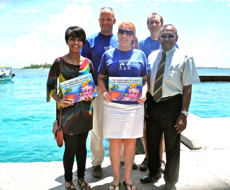Baa atoll Maalhos Councilor Abdul Matheen Solih has said the authority has been labeled the ‘Gondu’ – or junk – council after they started actively participating in improving the island’s waste management.
“The islanders have started calling us the ‘Gondu’ after we have physically started going to the junkyard and working on the waste management,” said Matheen.
Matheen and his fellow councillors have been the labelled with the derogatory term after they set out to do what the majority of the country has failed to by recycling materials rather than burning them or dumping them in a landfill.
Public disregard for work done towards the betterment of the environment was one of the main issues raised at the recent SLOW LIFE symposia which brought local environmental NGOs, councillors, and government officials together to discuss responsible waste management and sustainability.
The symposia – held on November 17- was a sister event to the annual SLOW LIFE Symposium which has previously seen the participation of philanthropists and celebrities such as UK entrepreneur Richard Branson and actor Ed Norton.
Maalhos council also complained of the lack of response from the government to the opposition majority council, with Matheen recalling the failure to be provided with the MVR45 (US$3) needed for gloves for safety reasons while working at the junkyard.
He provided assurance, however, that the council would not succumb to the challenges, revealing plans to implement a sustainable waste management system by adopting the recycling based model currently implemented in Baa Atoll Ukulhas.
NGOS making a difference
Meanwhile, Environmental NGO Save the Beach highlighted the plight of Villingili beach – filled with garbage every weekend by visitors from the capital Malé, where there is no natural beach.
Save the Beach – which started as a youth movement in 2008 aiming to conserve the natural beauty of the Villingili beaches – now conducts clean up and awareness programs not only in Villingili but also in many other inhabited islands.
Speaking of the busy Villingili beach, co–founder Hassan Ahmed ‘Beybe’ said that the NGO has no other option but conducting daily clean-ups alongside major clean up events to keep the beach garbage free.
A recent Save the Beach organised beach clean-up saw the participation of officers and crew from the USS Rodney M Davis – the US Navy’s 7th fleet missile frigate on its last tour of duty.
When asked about the reception of the work done by the NGO, ‘Beybe’ said that they have received positive support from the Villingili community and that it now “understands the importance of preserving the beach”.
Other active NGOs present at the Symposia included his manta ray awareness and conservation organisation Manta Trust, Maldives Lifeguard Association, Dhi Youth Movement and Maldives Body Boarding Association.
Environmental Activism
Environmentalist, Aishath Niyaz who has been involved in environmental activism for over 12 years shared her experiences as an activist and highlighted some of the broader issues with the current environmental situation in the country.
“The biggest constraint is definitely managing finances. I am very lucky as I do not have huge expenses but sometimes I wonder how long I will be able to keep on going like this,” said Aishath.
Aishath’s concerns of financial difficulty were not unique to her but were echoed throughout the Symposia by many of the younger participants.
Having reviously worked at various related institutions, Aishath now provides technical support for local NGOs and small authorities after completing her education in sustainable development by making a decision to not work in institutions which “lack integrity”.
Proving that activism can be done in various forms and arts was local photographer Asad Nazeer ‘Funko’ who, while specialising in fashion and portrait photography, also creates thought provoking art pieces about pressing environmental and social issues.
SLOW LIFE
The event was organised by the award-winning Soneva Fushi resort whose founders Sonu and Eva Shivdasani initiated the SLOW LIFE foundation based on the resort’s philosophies of low impact and sustainable luxury tourism with SLOW LIFE being an acronym for Sustainable-Local-Organic-Wellness and Learning-Inspiring-Fun-Experiences.
While speaking at the event, Shivdasani said that the SLOW LIFE initiative reflects Soneva group’s core beliefs such as ‘intelligent luxury’ and that he believes that dedicated businesses, not governments will bring change to the world.
The participants at the Symposia were given a platform to voice their concerns over environmental sustainability in the Maldives, resulting in an action plan for the upcoming year to address these environmental challenges.
The day long symposia, which included a tour of Soneva Fush’s gardens and waste management programme, ended with discussions on ‘real’ actions that can be done in the next 12 months to contribute to the cause.
During the discussions, the individuals and NGOs chose to commit to different initiatives which will come under the banner ‘Clean Maldives’.
Related to this story
Climate experts and celebrities converge on Maldives for Slow Life Symposium

